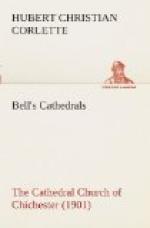[37] Strype, quoted by Dean Stephens, p. 190.
At the close of Mary’s reign Bishop Christopherson died, and in his place Elizabeth put #William Barlow# (1559-1568), who had been removed from the see of Bath and Wells by her predecessor. He made some attempt to remove a variety of irregularities which had been introduced since the death of Sherburne, for the services of the Church had become much disordered in consequence of the many changes of attitude which had been favoured by the rulers, both civil and ecclesiastical, during nearly thirty years. Barlow’s endeavour to bring this chaos to a new order was in accord with the methods of those who sought reform. He tried to carry out the injunction of Parker, the Primate, whose aim was to “reduce all to a Godly uniformitie.” But any desire for unity in diversity was not likely to be satisfied unless it was sought for with at least some unanimity of hope and aim. After his death the see remained vacant for two years.
#Richard Curteys# (1570-1583) found the revenues of his see so reduced that he was unable properly to fulfil the ordinary obligations of his position. He did not spare himself in his endeavour to do the duties he had undertaken. With the assistance of others he methodically instructed the diocese under his charge, an well was this done that a contemporary said “the people with ardent zeale, wonderful rejoicinge, and in great number, take farre and long journeys to be partakers of his good and godly lessons.” [38]This excellent man, however, owing to the political spoliation of the church, died impoverished in 1583.
[38] Kennett’s Notes: see Stephens’ “Diocesan History of Chichester,” p. 197.
From 1583 till 1585 no bishop was appointed, but in the latter year #Thomas Bickley# (1585-1596) was selected.
#Antony Watson# (1596-1605) was Bishop of Chichester when James became king. He was occupied much in furthering Whitgift’s endeavour to improve the condition of the Church in England by urging conformity to the newly ordered methods of ecclesiastical government and procedure.
#Launcelot Andrews# (1605-1609) then ruled the diocese until he was transferred to Ely.




